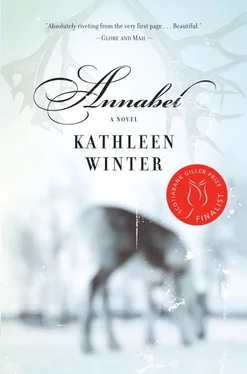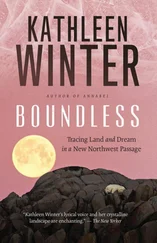Treadway did not untangle any more strings. He took a pencil out of his pocket, found a package of soldering wire that had no writing on the back, and drew Wayne a diagram. He drew two concentric circles.
“This is how the Romans did it. You can’t be thinking about the thing from the top down. This is a cofferdam. They drove a circle of piles deep into the riverbed. Then another circle inside it. Then they filled the outer ring with a kind of clay.”
“Dad.”
“Real waterproof stuff. Then, the water trapped inside, in the inner circle, they got slaves with buckets to bail it out. People died. They got crushed. But they emptied that inner circle. They made a dry spot right in the middle of the riverbed. They built the central pier of a bridge or section of a bridge in that.”
“Dad, I just want to make something really easy.”
“There is nothing really easy, Wayne. Not in this life. Not if it’s any good. I’m telling you, if you want to make any kind of structure over that creek, even a small creek like that, you need to think about the river bottom. Measure it and study it. If you don’t do that, your bridge is going to fall, with you in it. What kind of a father would let that happen to his son?”
“Dad, the creek has only got, like, eight inches of water in it.”
“What I’m saying is, Wayne, you’ve got to study what’s below that eight inches of water. Is it mud? Is it stone? Is it sand? Is it going to be gouged out by the current? You’ve got to know what you’re building on. If you do that, if you study it real good, mind, you can have that wood, son. I’ll help you get started. We can start on it this afternoon if you want.”
Wayne wanted the wood but he was not sure he wanted his father to help him make a bridge over the creek. “Will we finish cleaning up the cabbages?”
“That’s what your mother calls them. Cabbages. Instead of cabbage. That’s one way you can tell she wasn’t born in Labrador.”
Wayne knew his father was right. Anyone from Labrador called vegetables by their single name. Cabbage. Turnip. Carrot. No matter how many individual specimens, you spoke of them as one entity. He realized Treadway thought about people in the same way. Men, to him, were all one man.
The outer cabbage leaves insulated the inner parts, which Wayne’s mother rationed until mid-June, two weeks away, when there would be fresh turnip greens and dandelion. The cabbages hung hard and cold and knocked Wayne’s head when his mother sent him to get berries out of the barrels, and that hurt. You had to smack the berries with the cup, then they rolled apart, clicking like cold marbles. The shed was dark. You felt your way to the produce. The food transformed once Jacinta boiled it in the kitchen: its colours and flavours burst alive as if the wood fire were the heat of the sun, which Treadway said it was, indirectly. A lot of Labrador was like that. Dull and frozen and in the dark one minute; bursting with sour and sweet and red and green when you did something with it. Labrador was a place where the human touch meant everything.
“What you really want over that creek,” Treadway said in the kitchen, “is a simple cantilever.” He tore the top flap off the cornflakes box and raised his pencil stub.
“Dad, it doesn’t have to be anything complicated.”
“That way you won’t have to deal with the creek bottom. See?” He showed Wayne a diagram. “You anchor each end to a couple of bases on the riverbank and they meet in the middle.”
“But there’s a crack in the middle. It’ll fall down.”
“It won’t. The end pieces are going to anchor it. I have some cement and some rebar and some old bolts from Graham Montague’s wharf. What we need to do is each get a shovel and start digging foundations for the posts.”
“Dad, I don’t want to get a shovel. I have math homework.”
“What kind of math homework?”
“Measuring triangles. We have to find out the lengths of the missing pieces.”
“Perfect. Get your math homework out and we’ll incorporate it into our construction project.”
“Dad.”
“Come on, it’ll be fun.”
It was a Saturday and on Saturdays Jacinta made bread, so they were all in the kitchen most of the day. The radio was on. There was rain against the windows and some steam, and the family felt happy. By the time Jacinta had kneaded six loaves and set them to rise twice, the table was covered in drawings. Treadway was concentrating on the bridge as if it was his own, and Wayne liked making fair copies of the diagrams with a six-inch metal ruler and a carpenter’s pencil Treadway had sharpened with a razor. He liked the flat, chunky width of the pencil.
“Can I keep this pencil, Dad?”
“Yes, son, you can have it.”
In the morning Treadway took him to the creek to haul up the old logs and dig holes and build forms for the posts. He showed Wayne how to use a pickaxe and how to mix cement. Wayne liked the sound cement made when you had it wet, when you mixed it with the shovel: a sluicing, slicing sound that meant you were making something big. His father showed him how to mix stones into the cement, and how to place the rebar inside the forms. It took three weekends of this before they had four support posts ready.
“When is it going to be done, Dad? School is over. Me and Wally want to use the bridge and all we’ve got done is the posts.”
“You and Wally Michelin?”
“Yes. We really want to use the bridge.”
“I thought you were going to play on the bridge with some boys, Wayne. Brent Shiwack and some of the other lads.”
“No! I want to go on it with Wally.”
“I was thinking we should construct the bridge so you can remove a section if you don’t want the other team to be able to cross it. That is an old, old tactic used in wartime for millennia.”
“Dad. I want to be on the bridge with Wally Michelin. We’re not going to have wars. And all we’ve got done is the posts. It’s taking way too long.”
“Your posts are everything, Wayne. The foundations of anything are the thing itself. Now we’ve got them done, the rest is easy. We fit the boards, we clamp them, and we have it done. If there was a heavy load passing over we would jack the two sections apart and compress them. I mean a really heavy load, like a train.”
Treadway had always constructed things more solidly than necessary. His sled was heavier than the sled of any other trapper in the harbour, which made it harder to haul, but it would never come apart. Wayne could see that this bridge was like Treadway’s other projects. It was sturdy and built to last, like Treadway himself. The bridge was four feet wide and ten feet across, and Wayne had to admit he could do just about anything to that bridge and it would not collapse.
“But what am I going to do for sides?”
“You have to design them. Get your pencil out. You can put any kind of sides you want on that. Here, we’ll put three posts along each side and you can attach whatever you want to those posts. You can use wood or wire or rope or whatever you want.”
“I want it covered. I want it so me and Wally can see out but no one can see in. I’m going to ask Mom for some curtains.”
“Curtains?”
“Yeah, Mom has stuff she was going to give me.”
“Drapes?” Treadway asked Jacinta when Wayne had gone to bed. “China? A carpet?”
“It’s just old material I never got around to using.” The brocade had lain on a shelf since before Wayne’s birth. Its thread glowed on a matte background. “Wayne thought it looked royal and old-fashioned.”
“We never had anything like that in our forts. We used ours for storing things we didn’t want our mothers to see.”
“Would you rather he had beer and ammunition?”
Читать дальше












